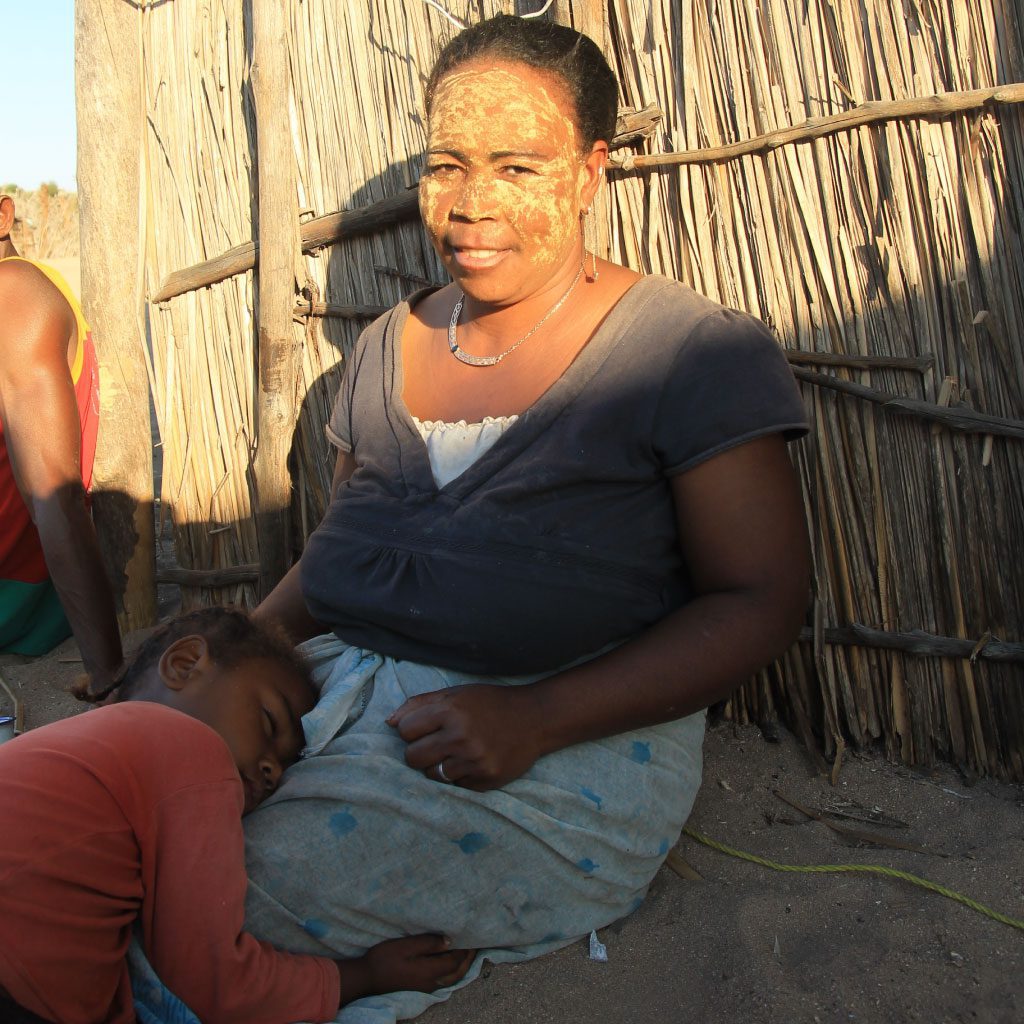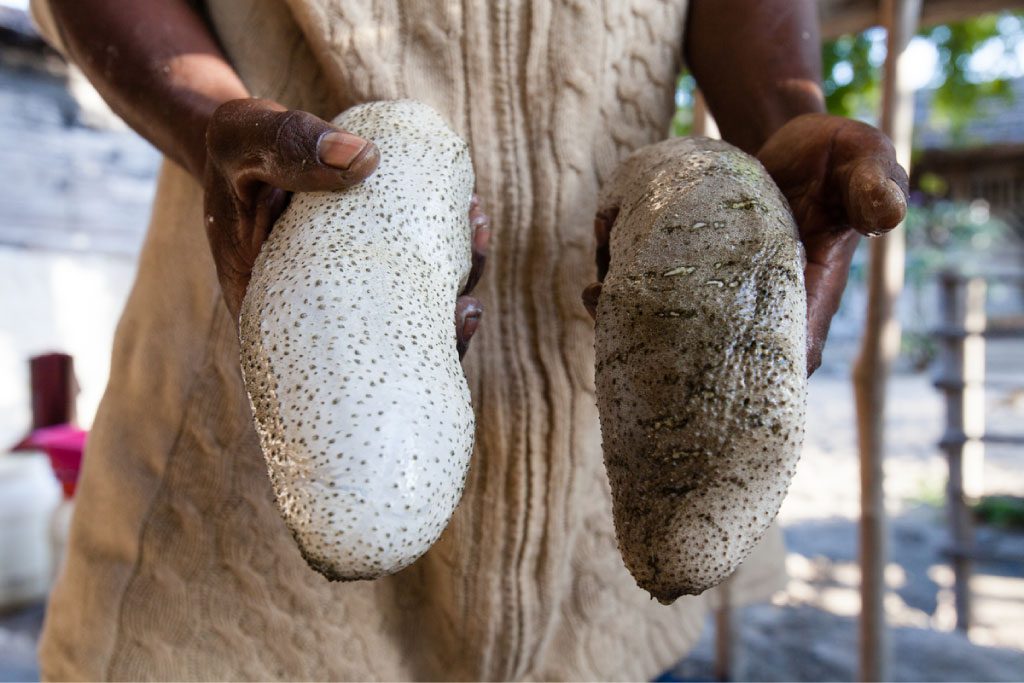The livelihoods and cultural identity of Vezo people in southwest Madagascar are intimately intertwined with the marine environment. Vezo livelihoods, however, are increasingly threatened by overfishing and mangrove deforestation, largely driven by demand from outside markets. Climate change is also having an impact, creating inconsistent wind patterns and rough seas too dangerous for fishing. Blue Ventures has been working with partners to pioneer viable alternatives to fishing to support alternative livelihoods, alleviating pressure on fisheries while gaining a new source of sustainable income through lomotse (seaweed) and zanga (sea cucumber) farming.
This series of aquaculture profiles, written by Angelina Skowronski, explores the opportunities for livelihood diversification and capacity building through the eyes and words of Vezo fishers themselves.

Two years ago, Clarisse and Ringo packed up their family of nine and moved from Bevohitse in the south of Velondriake to Ambolimoke in the north.
They were following the fish.
“My father lives [in Ambolimoke] and said that the fishing was better up here so we moved. We weren’t catching much in Bevohitse and couldn’t support our family,” says Clarisse.
Clarisse is an octopus gleaner and Ringo is a fisherman. They live the proper Vezo lifestyle, “living and struggling with the sea.” So naturally, when fish and octopus stocks depleted in the south, they moved with the fish.
“The fishing is not what it used to be when I was younger. Basically our cost of living increased and the fishing decreased,” says Ringo.
[Tweet “They live the proper Vezo lifestyle, “living and struggling with the sea.””]
Fishing in Ambolimoke did not turn out to be as fruitful as they had hoped either, and they continued to struggle financially. Quickly, they caught wind of aquaculture from other farmers in the community.
“Other people were doing it so it seemed like a good idea,” says Clarisse. Her daughter looks relaxed on her lap as Clarisse strokes her head to sleep.

Clarisse, who normally spends her days roaming the sea grass patches at low tide gleaning for octopus, enjoys the work of farming. “I like going out to the pens and seeing the zanga (sea cucumbers) grow. The bigger they get, the more motivated I am to take care of the pens. I have a feeling of accomplishment at the end of the day,” she says softly, so as not to wake the little one dreaming on her lap.
Ringo, on the other hand, expels different feelings about the operation.
“I zanga farm because I have to, but I’d rather there be more fish in the sea so that I could go out fishing.”
It’s easy to see that Ringo is the salt of the earth; a true fisherman. He explains that he’s spent more hours on his laka (dugout outrigger canoe) than he has on tany (land). He boasts about his glory days, returning to shore with his laka nearly sinking from the weight of his catch. His skin is tanned leather, only the type one builds over many days at sea.
Ambolimoke has a checkered aquaculture history. Sea cucumber farms were introduced in 2010 with three farming families, but the project ground to a halt two years later after too many issues with theft. At maturity, a single zanga can be sold for as much as 5,000 Ariary, which is worth almost a fisherman’s full day of catch. The high value of zanga means the product is vulnerable to theft, and since farmers have to repay IOT hatchery for zanga juveniles, poaching mature zanga not only means stealing the fruits of the farmers’ labour, but also putting them in debt.
Blue Ventures made a second attempt to return zanga farming to Ambolimoke in 2013. This time the community built watchtowers to be manned by night guardsmen to deter prospective thieves from other villages. Two years on, with two large cyclone seasons in between which set progress back, the zanga aquaculture operation in Ambolimoke remains in its infancy. Thus, farmers have yet to realise the full economic gains.
“We’re still waiting to see if there are benefits from zanga farming. I know people in Tampolove who have been very successful, so I’m hoping that will happen here,” says Clarisse. Her motherly optimism is a perfect yin to her salty fisherman husband’s yang.

Since the zanga operation in Ambolimoke has not yet generated high yields, farmers are unable to afford a night guardsman for the watchtowers. To fill this position, they’re rotating night watch duties among the five farming families. The men of the families usually take on this task, giving new light to Ringo’s frustrations.
Zanga farming is time-consuming and makes me feel stressed. Guarding the pens gives me less time to fish. Fishing is my passion and makes me happy.”
The watchtower is a covered platform on stilts nearly 30 meters high. From the shore, it somewhat resembles a lighthouse. Twice a day the tower’s skinny legs are engulfed by the high tide, cutting four metres at the legs, making it look lonelier in the ocean’s vastness.
In addition to watchtowers, punishment for zanga theft has also been incorporated into dina, (customary law) as enforced by the fokonolo (community). According to dina, the penalty for zanga theft is repayment of full price of stolen product plus 100,000 Ariary (US $30) to the owner, and a goat (roughly valued at 60,000-80,000 Ariary = US $18-$24) to village elders.
The harsh dina punishment alongside watchtowers has decreased zanga poaching in other communities. The goal is for the same to happen in Ambolimoke.
In the meantime, Clarisse and Ringo continue to octopus glean, fish and zanga farm in order to make ends meet. Clarisse fears that if their lives do not improve in Ambolimoke, they will have to move elsewhere to find work or more fish. Ringo does not fear, he hopes.
He says, “I just hope the fish return.”
This is the third in a series of aquaculture profiles, written and photographed by Angelina Skowronski with additional photos by Garth Cripps, which explore the opportunities for livelihood diversification and capacity building through the eyes and words of Vezo fishers themselves.
You can find out more about our aquaculture work on our website. We would like to thank our partners for their commitment and expertise without which such projects would not be possible.

